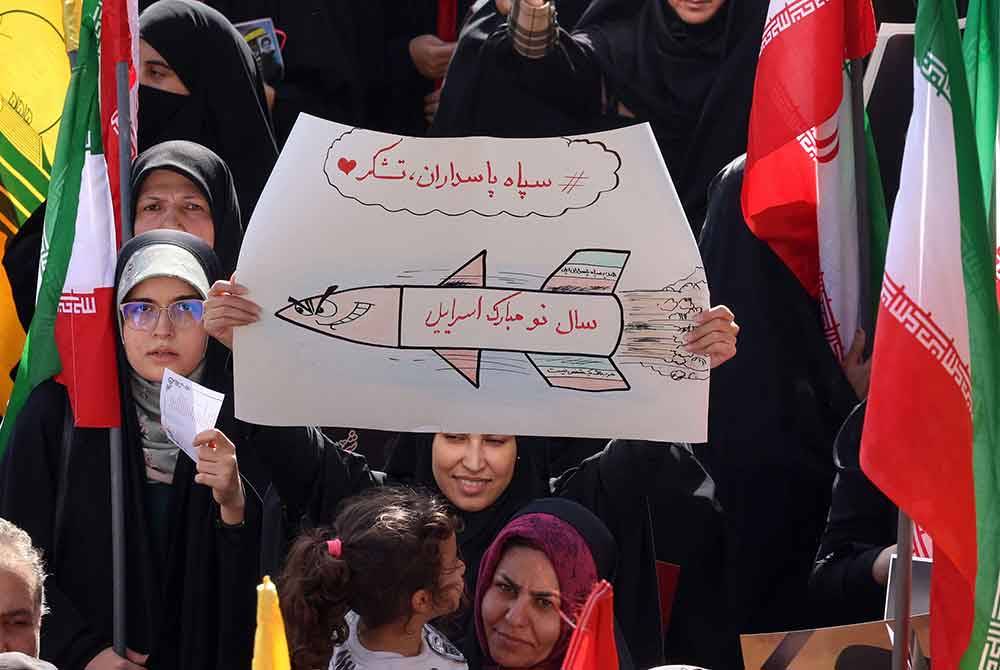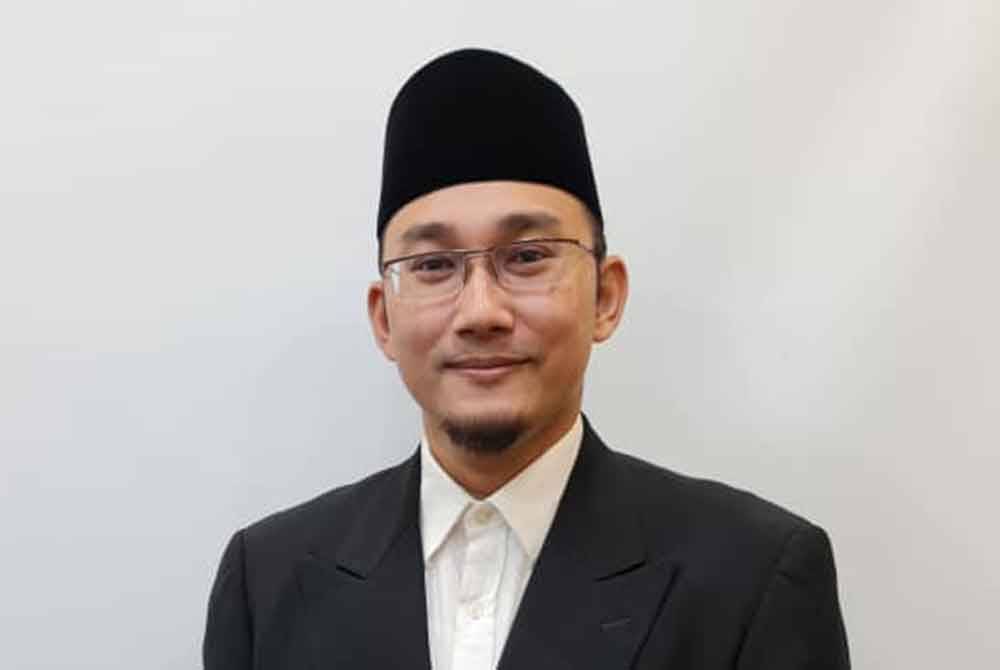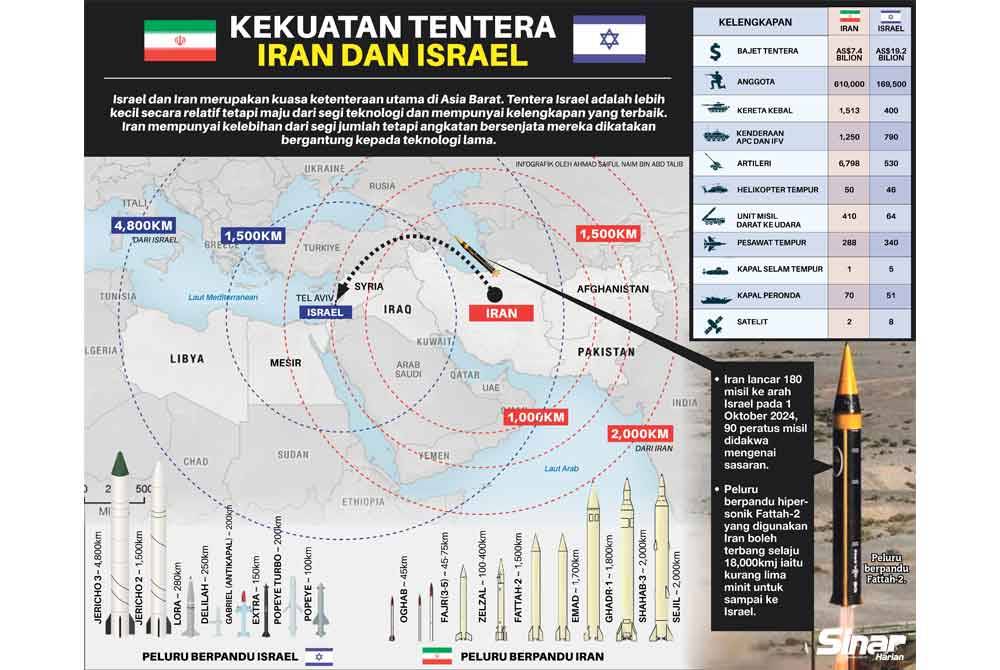Iran becomes hero while other Arab nations remain cowardly
Their counterattack on Israel was an act of self-defence in line with Article 51 of the UN Charter.

SHAH ALAM - Tensions in West Asia have escalated following Iran's surprise counterattack targeting the Zionist entity under Operation True Promise 2.0, a response to Israel's continued atrocities since the Gaza War broke out a year ago.
On Tuesday, Iran fired 180 ballistic missiles at Israel, penetrating the Zionists' most advanced air defence system, the Iron Dome, in retaliation for attacks on its ally Hezbollah in Lebanon.
Among the ballistic missiles used by Iran were the Ghadr, Emad and its latest hypersonic missile, Fattah.
Fattah is Iran's first domestically developed hypersonic ballistic missile, created by the Islamic Revolutionary Guard Corps (IRGC) and launched in 2023.
Iran's Ambassador and its Permanent Representative to the United Nations (UN) Amir Saeed Iravani said that Iran had the right to do so in response to the Zionist regime's aggressive actions.
Iran's counterattack on Israel was an act of self-defence in line with Article 51 of the UN Charter.
He said that this came in response to violations of Iran's territorial integrity and sovereignty by the regime, including the brutal assassination of Hamas leader Ismail Haniyeh in Tehran on July 31 and Sayyed Hassan Nasrallah, who led Hezbollah in Lebanon on Sept 28.
These tragic incidents were followed by Israel's attack last month using pager explosions which deliberately targeted innocent civilians.
Iran had also warned Israel that more drastic actions would be taken if the illegal state retaliated.
US and Sectarian Differences
As the Palestine-Israel war reignited on Oct 7, 2023, the world was reminded of the 1948 Arab-Israeli War, the 1956 Suez War and the Six-Day War of 1967.
May 15 this year also marked 76 years since the Nakba tragedy, an Arabic word meaning "great catastrophe."
Palestinians used the term to refer to the forced displacement and ethnic cleansing their ancestors experienced in 1948.
However, for many Palestinians, that nightmare seemed never to have no end.
On the other hand, the Arab League, an alliance of 22 member countries, appeared powerless to stop Israel's aggressive attacks on Palestine since last year, which resulted in up to 42,000 casualties.
Similarly, the Organisation of Islamic Cooperation (OIC), despite both global organisations condemning Israel's actions, only did so through roundtable discussions or diplomacy.
At the emergency session on Nov 13, 2023, for instance, the Arab League and OIC failed to reach a conclusive agreement and no sanctions were imposed on Israel or the United States (US), who were behind Palestine's suffering.
Even though the resolutions from the conference sounded impressive, the actions were incredibly weak.
They resolved that: "Taking no action is considered complicit, as it allows Israel to continue its brutal attacks, killing innocent people, children, the elderly and women, and destroying Gaza."
From the conference, Saudi Arabia, Jordan, Egypt, Qatar, Turkey, Nigeria and Indonesia were only given the minimum mandate to enforce a ceasefire as quickly as possible.
Universiti Sains Malaysia Islamic Political Economy Senior Lecturer Dr Mohd Syakir Mohd Rosdi provided insights as to why the OIC, particularly the Arab League, countries closest to Palestine, were unable to support and be a lifeline for the Palestinian people.

Within the member states of the Arab League, there were two opposing blocs: the Western mindset and the Islamic mindset and the ideological divide created two opposing factions that often clash in the Arab world.
Countries like Syria, Sudan, Libya, Iraq and Yemen, including Palestine, were not exempted from this issue.
Moreover, some Arab countries, like Saudi Arabia and the United Arab Emirates (UAE) had long been under the economic and political influence of the US, which acted like a narcotic and caused them to turn a blind eye to what was happening in Palestine.
"There is a division in decision-making and a lack of consensus. For example, Saudi Arabia and the UAE, which are closer to the US, are seen as under its umbrella.
"Many Arab League countries side with Saudi Arabia and the UAE and this relationship limits the decisions that need to be made.
"Even politically, they cannot unite. Islam cannot unite because of the political protection they receive. They cannot make decisions because there are countries being shielded," he told Sinar Premium.
Furthermore, sectarian conflicts between Sunni and Shia, according to Syakir, were another obstacle to the Arab League to play a more effective role.
"When sectarian differences arise, decisions are blocked because of these sectarian differences. This is why Muslims need to come together and find common ground. If we focus on sectarian issues, problems will arise.
"In the current situation involving Palestine, we cannot continue to dwell on sectarian differences. First, we need to know that we are Muslims, and so are they. This strength must be united under the banner of Islam, no longer prioritising differences," he said.
Learning from Iran

Regarding Iran's attack on Tuesday morning, Israel's arrogance in boasting about the prowess of its Iron Dome defence system was tarnished after ballistic missiles hit 90 per cent of enemy targets, including the Tel Nof airbase near Tel Aviv, the Nevatim airbase housing F-35 fighter jets and the Mossad intelligence headquarters, which planned assassinations of leaders under the anti-Israel Resistance Axis.
The Iron Dome was Israel's defence system, which automatically launched interceptor rockets from the ground to the air at ranges of up to 70 kilometres.
It acted as a shield to protect and intercept rockets, fighter jets, helicopters and unmanned aerial vehicles.
Iran's success was not only celebrated by Tehran but also by the people of Gaza and Muslims worldwide.
This is because, after a year of atrocities led by Zionist leader Benjamin Netanyahu, it was the first time their reputation as a country with the world's best war technology was humiliated by Iran.
Syakir added that the hero title given to Iran by the global community after the attack was well deserved, as it was the only Arab country brave enough to uphold its sovereignty and fight for the Palestinian cause.
"Some of the global community will see them as heroes. They may say Iran attacked because of the assassination of Haniyeh and Nasrallah, but in this situation, Iran is the only Islamic country brave enough to attack Israel.
"Iran helps Hezbollah. Hezbollah helps Palestine. So, there is a point of unity and similarity. The Arab League should learn from the unity of Hamas and Hezbollah. They are together despite being divided by sectarian differences," he said.
Even if a major war breaks out, he said, Iran's full strength remained unknown.
"If we look at the US, they have long warned Iran, but from the perspective of Iran's military strength, the US doesn't know. Moreover, Israel cannot intercept ballistic missiles.
"So far, Iran has not shown its full strength. Major powers will likely observe, but even if a war breaks out, it will only involve Arab countries," he added.











